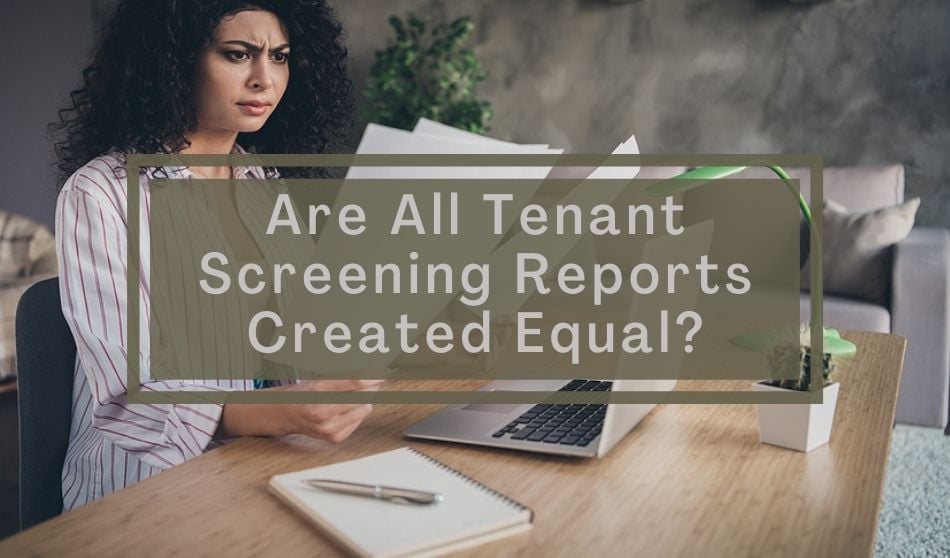Ever notice that when you search for tenant screening on Google how every option you click claims to have the “best” reports?
With over 20 million search results for “Tenant Screening”, how do you know which option really is the best and how do you know the reports you’ve ordered are accurate?
I’m going to break it down so you can determine if the reports you are ordering are actually accurate.
Credit Reports
We’ll start with the easy one, credit reports. There are only three bureaus with comprehensive credit databases. Experian, Equifax, and Transunion. It is common practice among debtors to report credit lines to all three bureaus so regardless of which bureau you get a credit report from you are going to get similar results. No bureau at this point is more accurate or less accurate than the others.
With that said, I prefer Transusion over the other two.
Why? Well, in 2017, Equifax was careless with public data and let hackers steal it in our country’s most massive data breach ever. I certainly will not trust them with my payment information at this point and wish I could opt out of them having my credit data on file as well.
Also, neither Equifax or Experian allow landlords direct access to credit reports, which (to me) makes them rather unfriendly towards landlords. In order to access credit, as a landlord or property manager, with either of these bureaus, you have to jump through the hoops of a tenant initiated report which not only is inconvenient for you and your tenant but can slow the process of getting the report by 30 minutes to 3 days.
At this time, based on my research, Transunion is the only provider who will allow landlords to directly view a tenant’s credit report. This means that you as a landlord can order and see the report instantly to make a decision right now, rather than wait up to 3 days.
Nationwide Criminal Report
Here’s where things get tricky. Unlike credit reports, where everybody has a social security number to be identified by, counties in the USA do not log criminal convictions by any unique identifying information. (I know, it’s crazy!)
Name and Date of Birth
Instead of using a social security number or another universal system, criminal convictions are logged by name and date of birth (dob) only. So unless your prospective tenant is named “Urhines Vogel Hazeldine”, or some other very unique name, there’s a good chance that another person with the same name has been arrested sometime for something. Have you ever Googled yourself or done a Facebook search on your name and seen how many people exist with your same name?
By adding the date of birth to the search it significantly narrows down the records, but with over 10,000 people being born each day in the United States, the chances of name and birthday conflicts are also very possible. It is further complicated when people use aliases and those aliases are logged in the counties instead of the birth name (yes, it happens all the time).
Criminal Reporting Coverage
The second major component of a nationwide criminal report is coverage. Prepare yourself… Just because a screening vendor says the report is “nationwide” doesn’t really mean you are getting full national coverage. This is true with all screening vendors, but it’s not the fault of the screening vendors.
The reason for this is not all states and counties allow their data to be used and/or they don’t make it available electronically. Many counties still don’t use computers for recording and disseminating criminal data and the only way to get to it is to read through tens of thousands of paper files.
So among the nationwide databases, there are low-quality databases and good-quality databases that screening vendors can choose from.
Low-Quality Databases
The low-quality databases have poor coverage and outdated results. They may not catch a conviction from 90 days ago because they might update their records only once every 3 years. Also, they will only obtain data from the counties that provide it easily for free.
High-Quality Databases
The higher-quality (and usually more expensive) databases update more regularly and have better coverage.
How then do you know if your chosen vendor is giving you good results?
- Verify coverage. Ask your vendor for a criminal coverage reference table. This will tell you which states and which counties they cover. Make sure your state and county are covered, that’s the most important, especially for local renters. But also be sure the nationwide coverage is good because your renters probably lived somewhere else before and you want to see criminal activity from all their prior locations. Click here to see an example criminal coverage reference table.
If your screening vendor can’t provide you detailed coverage information like this sample, there’s a good chance the coverage is so limited they are embarrassed to publish it.
Also be sure the criminal report includes a nationwide sex offender registry search so you know if your applicant is on the sex offender list.
If the nationwide report doesn’t cover a county that you want results for, then the best option is to order a county-level report.
Your screening vendor should give you the option of ordering specific county reports if needed. When you order a county-level report, your screening vendor will send somebody to the county seat who will pull all records for your subject and transcribe them into a report. This takes about 3 days to complete, but it is also the most accurate way to get current highly accurate results.
- Verify identity. Once you’ve ordered a report, you might get results that do not belong to your applicant. That’s because somebody with the same name (or alias) was convicted and the report is including it. Because convictions are indexed by name and date of birth, there’s no way a screening vendor can eliminate these from the list, so it is up to you to review it carefully.A neat trick I’ve learned is to review the convictions that do not include a picture and compare them to their address history report to see if they lived in the area of the conviction at any point of their lives.
This begs the question, since county-level results are the most current and accurate, why not order county-level results for every county in the country for the applicant. Good thinking, but that would cost you $60,140 per applicant, plus an additional $60,140 if they are married or have a roommate. Obviously, this is cost-prohibitive, so the best coverage (for a reasonable price) comes in the form of the nationwide criminal reports.
Nationwide Eviction Reports
Nationwide eviction reports are the trickiest item for a screening vendor to report. Most eviction reports are recorded in the courts by name only. This makes it very difficult for a screening vendor to return accurate eviction reports to their customers. Moreover, screening vendors have faced lawsuits from disgruntled tenants when they report inaccurate eviction data on a tenant so screening vendors are very cautious about what they display on these reports. You’ll run into three different types of eviction reports:
Type 1 returns all matching records. You’ll know one of these when you see it because it may be dozens of pages long. Every eviction in every county of every state with the subject’s name will be returned. It will then be up to you to ask the applicant which ones are valid, and hope that they tell you the truth. This is a terrible report and not only could get you in legal trouble for considering inaccurate records but will cost you a ton of time validating the results.
Type 2 returns only records that happen to have additional identifying information such as date of birth (DOB). Only a tiny fraction of eviction records are stored with DOB so this type of report would give you very inaccurate results and miss most of your subjects’ evictions. Don’t rely on this type of report.
Type 3 is the newest and most accurate method. A type 3 report will use Type 1 data and match every record against a prior address database for your subject. This way you get the widest possible results, but narrowed down to the specific addresses where your subject has lived.
Type 3 reports give you the most accurate results of all records available today, but still may not always catch 100% of the evictions. Here’s why:
- Not all counties make their eviction data available.
- The prior address database uses data sources such as utility bills, phone bills, and other information to connect a subject to an address. While it’s highly accurate, there are occurrences where a subject might live in a property and have all utilities and bills in somebody else’s name.
So while no screening reports are ever going to be 100% accurate, 100% of the time, the best possible reports you can use to protect your property (and sanity) are going to be a Transunion full credit report, a high quality nationwide criminal report, and a type 3 eviction search.
The good news is you don’t have to go to three separate companies to get this data. There are tenant screening vendors with relationships already built with these connections where landlords and property managers can sign up and receive all 3 reports quickly and easily with one order.
This article was originally published in November 2017 and has since been updated.







Hello Nathan! your guide regarding All Tenant Screening Reports Created Equal is amazing. yes i agree If you are a landlord, the most important things you can do is screen your prospective tenants carefully.
As a tenant looking for a new place what or where can I get the same info as a owner or landlord obtains on prospective tenants?
Hi Maria, The only reason you can order this information on another person is with a permissible purpose and their authorization. A landlord has permissible purpose for the reason of tenant screening, which would not apply to anyone other than landlords and property managers.
If you are interested in obtaining this information yourself, you can do that by ordering a copy of your own credit report from any or all of the three credit bureaus (Transunion, Experian, Equifax) or from http://www.annualcreditreport.com. You are entitled to one free report per year. There are also services out there that constantly monitor your credit and criminal reports like Identity Guard or Lifelock which are a great way to always know the whole picture.
Excellent article! I love to read this kind of information which help me a lot to get more details about tenant screening. Thanks for sharing